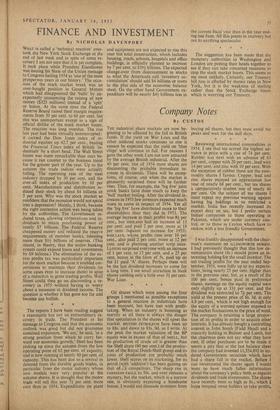Company Notes
By CUSTOS
THE industrial share markets are now be- ginning to be affected by the fall in British funds. If the yield on War Loan and the other undated stocks continues to rise it cannot be expected that the yield on 'blue chips' will continue to fall. For reasons 1 gave the other week I am not now attracted by the average British industrial. After the 40 per cent, rise of 1954 most shares are discounting the probable immediate in- crease in dividends. There will be excep- tions, of course, and when the market is pleasantly surprised there will be further rises. Thus, for example, the 'big five' joint stock banks have done much to keep the 'bull' market boiling. After the dividend in- creases in 1953 few investors expected much more to come in respect of 1954. Yet all the 'big five' have distributed more to their shareholders than they did in 1953. The average increase in their profits was 8+ per cent., but MIDLAND had an increase of 13 per cent. and paid 2 per cent. more at 18 per cent. (against no increase for 1953). BARCLAYS, whose profits rose over 10 per cent., also paid 2 per cent. more at 12 per cent. and is planning another scrip issue. LLOYDS surprised everyone with an increase of 1 per cent. to 15 per cent. and a 25 per cent. bonus in the form of 5s. paid up on the £1 paid 'A' shares. Perhaps these will be the last dividend increases to come for a long time. I see small attraction in bank shares yielding only a little over 34 per cent. War Loan.
Oil shares which were among the four groups I mentioned as possible exceptions to a general reaction in industrials have been buoyant, but have met with profit- taking. When an industry is booming as merrily as oil there is aliVays the danger that speculation in the shares will upset the market. BRITISH PETROI.EUM have been up to 88s. and down to 83s. 9d. as I write. At the peak the market valuation of the BP equity was in excess of that of SHELL, but its production of crude oil is greater than the Shell share (40 per cent.) of the produc- tion of the Royal Dutch-Shell group and its costs of production are probably much lower. Shell scores on its marketing, for its petrol (with 'additive') has been gaining on thit of ;:s competitors. The sharp rise in CANADIAN EAGLE to 50s. and over remains a mystery, but the market, which is a narrow one, is obviously expecting a handsome bonus. I would not dissuade investors from
buying oil shares, but they must avoid the peaks and wait for the dull days.
Reviewing international commodities in 1954, I see that tea scored the highest ad- vance in price with a rise of 74 per cent. Rubber was next with an advance of 63 per cent., copper with 20 per cent., lead with 14 per cent. and zinc with 10 per cent. With the exception of rubber these are the com- modity shares I favour. Copper, lead and zinc shares enjoyed an appreciation last year of nearly 68 per cent., but tea shares a comparatively modest one of nearly 46 per cent. On the subject of tea shares I must repeat my previous warning against having big holdings in so restricted a market. India has recently increased its export duty on tea, but I prefer certain Indian companies to those operating in Pakistan, which are under currency con- trol, or to those in Ceylon which have to reckon with a less friendly Government.
•
I was frankly disappointed with the chair- man's statement on 1LLINGWORTH MORRIS. 1 had previously thought that this low de- nomination share (4s.) should prove an in- teresting holding for the small investor. The net trading profits for the year ended Sep- tember, 1954, were fully up to my expecta- tions, being nearly 25 per cent. higher than in the previous year, but, as a result of the 100 per cent, bonus paid in preference shares, earnings on the equity capital were only slightly up at 33} per cent. and the dividend was restricted to 7-1- per cent. The yield at the present price of 6s. 3d. is only 4.8 per cent., which is not high enough for the equity of a worsted spinner exposed to the market fluctuations in the price of wool. The company is retaining a large propor- tion of its profits in order to acquire other interests. It has already bought a controlling interest in John Smith (Field Head) and a minority holding in Bulmer and Lumb, but the chairman does not say what they have cost. If other purchases are to be made it seems a pity that at the last balance sheet the company had invested £1,354,892 in un- dated Government securities which. have had a sharp fall in the market. Before I can recommend the shares again I would want to have much fuller information about the company's policy both as regards dividends and trade investments. The shares have recently been as high as 8s., which I hope tempted some holders to take profits.


































 Previous page
Previous page